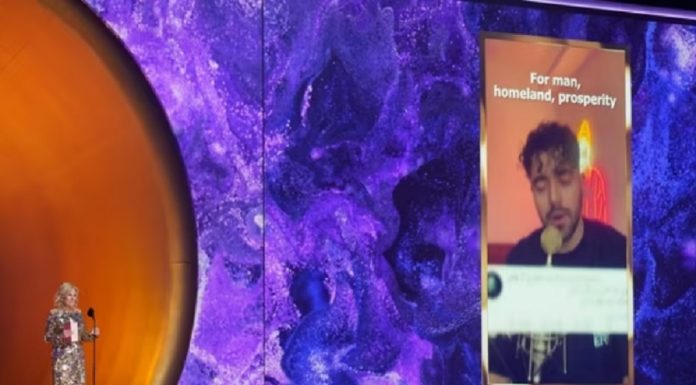By Kayhan Life Staff
In a recent ruling by the Revolution Court, Shervin Hajipour, a 25-year-old singer, was sentenced to three years and eight months in prison for his protest song ‘Baraye.’
The song gained prominence during a nationwide protest sparked by the death of Mahsa (Zhina) Amini in September 2022 while in the custody of the Morality Police in Tehran.
Mr. Hajipour has also received a two-year travel ban and has been ordered to read “Women’s Rights in Islam,” a book by the conservative Islamic scholar the late Morteza Motahari (1919-assassinated in 1979).
Hajipour has been instructed to “compose music focusing on America’s atrocities against humanity and document human rights abuses carried out by the U.S. government in the past century” as part of his punishment.
US Condemns Sentencing of Iranian Singer Shervin Hajipour Who Won a Grammy
Shervin Hajipour’s “Baraye” received the Best Song for Social Change Award at the 2023 Grammy Awards. It was the first song published on the internet after the death of Mahsa Amini. Some 40 million people viewed the piece within 24 hours of its release online.
Alarmed by the international popularity of “Baraye,” whose lyrics included tweets by ordinary Iranians, the Islamic Republic arrested Mr. Hajipour immediately after the song’s release and removed the piece from his Instagram account.
The song, which became a revolutionary manifesto, has been translated into a dozen languages and performed by several Iranian and international artists.
Hajipour published the recent court ruling on his Instagram account on March 1.
The judge in the case sentenced Hajipour to two separate custodial terms for distinctive charges: “propaganda against the state” and “inciting unrest and public disturbances aimed at undermining national security.” The former charge resulted in an eight-month prison term, while the latter led to a maximum three-year sentence under Article 134 of the Islamic Republic Penal Code. Considering the time already served, he will spend three years in prison.
The ruling said: “Given that the maximum punishment allowed under the Islamic Penal Code for the principal offense was insufficient in reforming the perpetrator, the person was handed a two-year travel ban and ordered to compile the Islamic Revolution’s cultural, scientific, and artistic achievements, and publishing them on the internet under his name.”
“The individual is also required to study and summarize separately two books: ‘Women’s Rights in Islam,’ and ‘Woman in the Mirror of Glory and Beauty’ [by conservative scholar Abdollah Javadi Amoli (1933-)],” the ruling explained. “Each summary must be handwritten, totaling thirty pages, and submitted to the relevant authority and published online.”
“The person must also compose music focusing on America’s atrocities against humanity and document human rights abuses carried out by the U.S. government in the past century, and publish them online,” the ruling added. “The person must attend training courses on behavioral skills in the arts.”
Hajipour was arrested by intelligence units in Sari, in the northern province of Mazandaran, following the release of his protest song “Baraye” amidst the nationwide unrest in 2022. He was released on October 4, 2022, after posting a $2,500 bail.
Hajipour was brought before the investigative branch 11 of the Sari Prosecutor’s office. Majid Kaveh, Hajipour’s lawyer, disclosed on “X” (formerly known as Twitter) that his client was charged with “propaganda activity against the state and inciting people to violence.” Mr. Kaveh added that the Judiciary had imposed a six-month travel ban on Hajipour.
Hajipour’s protest anthem, “Baraye,” was released amidst the 2022 nationwide protests, drawing inspiration from the tweets of Iranian users regarding the ongoing demonstrations. The song resonated deeply with protesters in Iran, garnering nearly 40 million views within the first 24 hours of its release.
Even after its removal from Hajipour’s Instagram page, “Baraye” continued to be shared widely, sung collectively in various languages by artists and ordinary citizens across the globe. Renowned musicians like Roger Waters also commended Hajipour’s artistic ingenuity and the impact of “Baraye.”
In February 2023, the Grammy Awards recognized the powerful impact of music on social change by introducing a new category: the “Best Song for Social Change Award.” The inaugural winner of this prestigious award was Shervin Hajipour for his song “Baraye.”
The song’s theme, “Woman, Life, Freedom,” resonated with people worldwide, including U.S. President Joe Biden’s wife, Jill Biden. During the Grammy Awards ceremony, she presented the award in this category and spoke highly of Hajipour’s work, emphasizing the significance of his song’s message.
“More than 130,000 people have responded with songs that promote awareness, raise consciousness, and inspire change,” Mrs. Biden said at the ceremony. “The winner of this special award was selected by a blue-ribbon committee and ratified by the Recording Academy board of trustees.”
“Tonight, I am honored to announce the first of the Recording Academy’s best song for social change, Shervin Hajipour, an Iranian singer and songwriter, for his song Baraye,” Mrs. Biden added. “This song became the anthem of Mahsa Amini’s protest. A powerful and poetic call for freedom and women’s rights.”
According to the “Recording Academy,” out of 115,000 registered in the Instagram and TikTok “Grammy” campaign, 83 percent voted for Shervin Hajipour’s “Baraye” to receive the special award.
Time magazine released its list of “100 Influential People of 2023,” which included notable individuals from various fields such as politics, art, entertainment, science, and activism. Among the influential figures who made it to the list are Shervin Hajipour and Iranian journalists Niloufar Hamedi and Elahe Mohammadi, who were imprisoned during the 2022 unrest.
Shervin Hajipour has written 88 songs, including 33 released songs, three soundtracks, four music videos, and 48 unreleased songs. Hajipour’s first single, “Shayad Behesht,” was released in March 2019 on various social media platforms. The song gained popularity among the young generation in Iran.


